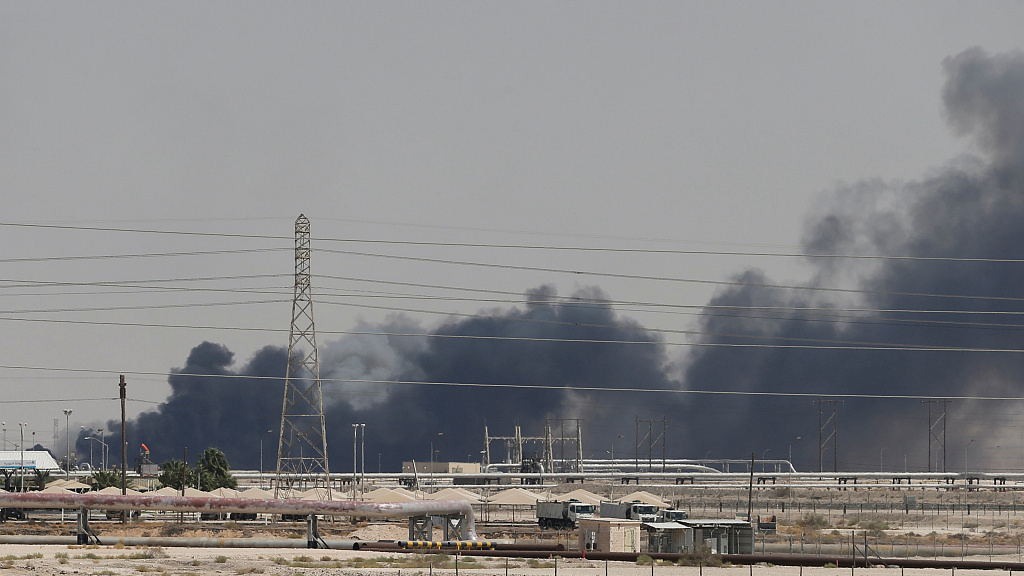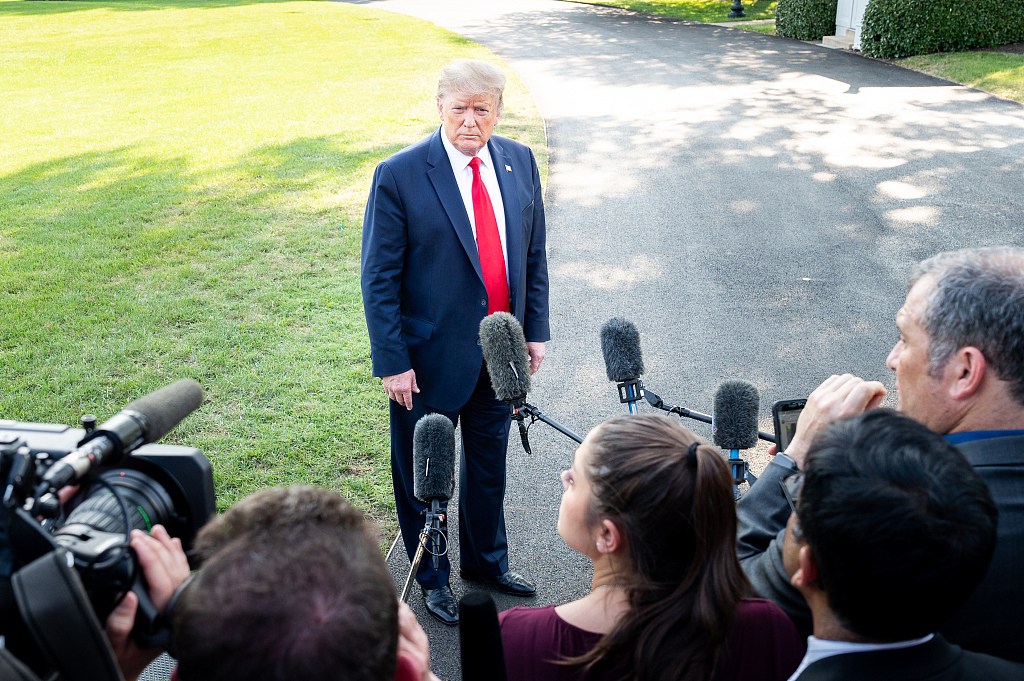
Editor's note: Tom Fowdy, who graduated from Oxford University's China Studies Program and majored in politics at Durham University, writes about international relations focusing on China and the Democratic People's Republic of Korea. The article reflects the author's views, and not necessarily those of CGTN.
Last weekend, an attack occurred on the Saudi Arabian owned ARAMCO facility (officially the Saudi Arabian Oil Company) in the form of a suspected drone strike. The blasts caused significant damaging, wiping out half of the country's oil production and sending prices surging. The insurgency group based in Yemen waging war against the monarchy, known as the Houthis, immediately claimed responsibility for the strike. The Kingdom of Saudi Arabia itself has not named a perpetrator.
However, in sharp contrast, the White House has already decided who to blame: Iran. Without a pause of breath nor investigation, senior officials from Mike Pompeo to President Donald Trump himself had condemned the blast as an act of Iranian aggression, subsequently threatening severe consequences. The State Department and Pentagon have also claimed that because the strike came from the North East Angle, it did not originate in Yemen but rather this is "proof" Tehran is responsible. Inevitably, Iran denies the allegations and has strong grounds to do so.

U.S. President Donald Trump speaks to reporters, Washington, D.C., September 16, 2019. /VCG Photo
U.S. President Donald Trump speaks to reporters, Washington, D.C., September 16, 2019. /VCG Photo
Although Trump was proposing diplomacy and sanctions relief a week ago, the pendulum has swung well back towards confrontation. Although it is silly to argue the U.S. staged the attack for their own gain, we know from memory that Washington has a long history of weaponizing deception to pursue aggressive foreign policy objectives, particularly in the Middle East. Iran is an easy target, and we must see these events through the prism of opportunism above anything else. All evidence suggests the Houthis were, in fact, responsible.
American foreign policy utilizes a high degree of deception to justify assertive, particularly military, actions against others. Because the United States claims for itself a mantra of self-righteousness which is said to oppose aggression, the burden rests upon Washington politicians to claim military action is an act of greater good addressing a connotative threat to the country’s values and standing. This leads to a campaign of public induced deception to win support for conflict, always taking the form of a hyper and unrealistic exaggeration of the "threat" in question.
History is filled with obvious examples.
In 2003, the invasion of Iraq happened under the utterly false claim that Saddam Hussein had possessed "weapons of mass destruction" which would be given to terrorists and used against allied countries. In 2017, the U.S. claimed the Democratic People's Republic of Korea (DPRK) was aiming to strike the country with a nuclear missile and that conflict was imminent, using the exaggerated threat to gain support for aggressive action against the state. In each instance, the mainstream media discourse replicates and supports such deception.
Thus this leads us onto the issue of Iran. Quite obviously, Iran is the easiest country in the world to demonize and blame from an American perspective, posing no political consequences or repercussions whatsoever. As a Shiite theocracy with a burning grievance against Washington, it is incredibly easy to frame the state in the discourses that have emerged since the September 11 attacks, that Iran is a dangerous, evil and inhumane terror state which wishes pain and death upon Americans.
Cliches and stereotypes of war, carnage and terrorism in the Middle East most notably associated with the public image of Islam, make this a smooth and believable discourse. Even though in practice, Iran's Shia "in one nation-state" ideology is entirely different to the Sunni inspired Salafi-Wahabism (which motivates groups such as the ISIL), the public obviously doesn't know that, therefore to demonize Iran in this light on the back of painful memories such as 9/11 means that not only will people believe in this narrative, but very few will have an objection to it.
In this case, while America did not stage the attack on Saudi facilities, the blaming of Iran should be understood as a blunt act of opportunistic deception, which is being used to gauge hostility and potential support for military action against the country. The claims come despite the fact the Houthis have been firing ballistic missiles at Saudi infrastructure for years, something that has not received much media coverage.
In this case, it makes the origin of the attack quite evident for any shrewd observer of the conflict in Yemen, and one cannot possibly configure a rational nor explainable reason as to why Iran would randomly attack the core facilities of a neighboring country and risk a full-blown regional conflict, but of course, this is what America wants you to believe in the framing of Tehran as unstable and irrational, thus showing how deception continues to lead and shape Washington’s foreign policy discourse on a near-daily basis, never critiqued nor touched upon by the mainstream media.
(If you want to contribute and have specific expertise, please contact us at opinions@cgtn.com)